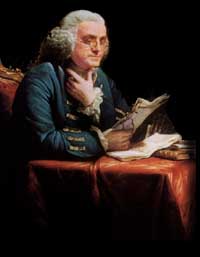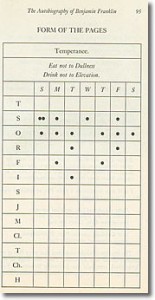
Picture courtesy of ushistory.org
Last Thursday, I celebrated the one year anniversary of this Habit Chef Project with a recap of the 32 profiles we’ve shared. The idea took years to develop, but the initial seed was planted in 2010 when I read The Autobiography of Benjamin Franklin. I was inspired by the systematic methods he used to improve himself, so it was only fitting that he was the subject of my first profile. It focused on the way he invested in relationships, developed a daily routine, a dutifully tracked his progress towards achieving his goals.
In his quest to be a better man each year, Franklin identified 13 virtues that he centered his life around. In the article’s comments, Nathaniel Eliason of 52 Weeks of Habits suggested that I share a follow-up article focusing on the virtues he selected. I thought that was a perfectly fitting way to kick off our second year, and we’ll start with Ben’s own words.
My intention being to acquire the habitude of all these virtues. I judg’d it would be well not to distract my attention by attempting the whole at once, but to fix it on one of them at a time; and, when I should be the master of that, then to proceed to another, and so on, till I should have gone thro’ the thirteen; and, as the previous acquisition of some might facilitate the acquisition of certain others, I arrang’d them with that view, as they stand above.
Without further ado, here is the list he famously kept with him at all times.
- Temperance. Eat not to dullness; drink not to elevation.

- Silence. Speak not but what may benefit others or yourself; avoid trifling conversation.
- Order. Let all your things have their places; let each part of your business have its time.
- Resolution. Resolve to perform what you ought; perform without fail what you resolve.
- Frugality. Make no expense but to do good to others or yourself; i.e., waste nothing.
- Industry. Lose no time; be always employ’d in something useful; cut off all unnecessary actions.
- Sincerity. Use no hurtful deceit; think innocently and justly, and, if you speak, speak accordingly.
- Justice. Wrong none by doing injuries, or omitting the benefits that are your duty.
- Moderation. Avoid extremes; forbear resenting injuries so much as you think they deserve.
- Cleanliness. Tolerate no uncleanliness in body, cloaths, or habitation.
- Tranquillity. Be not disturbed at trifles, or at accidents common or unavoidable.
- Chastity. Rarely use venery but for health or offspring, never to dullness, weakness, or the injury of your own or another’s peace or reputation.
- Humility. Imitate Jesus and Socrates.
I determined to give a week’s strict attention to each of the virtues successively. Thus, in the first week, my great guard was to avoid every the least offence against Temperance, leaving the other virtues to their ordinary chance, only marking every evening the faults of the day. Thus, if in the first week I could keep my first line, marked T, clear of spots, I suppos’d the habit of that virtue so much strengthen’d and its opposite weaken’d, that I might venture extending my attention to include the next, and for the following week keep both lines clear of spots. Proceeding thus to the last, I could go thro’ a course compleat in thirteen weeks, and four courses in a year.
To me, the insights that are more interesting than the list itself is the thinking that preceded it.
It was about this time I conceiv’d the bold and arduous project of arriving at moral perfection. I wish’d to live without committing any fault at any time; I would conquer all that either natural inclination, custom, or company might lead me into. As I knew, or thought I knew, what was right and wrong, I did not see why I might not always do the one and avoid the other. But I soon found I had undertaken a task of more difficulty than I had imagined.
While my care was employ’d in guarding against one fault, I was often surprised by another; habit took the advantage of inattention; inclination was sometimes too strong for reason.
Reading those words again, it’s strikes me that Franklin documented the very first habit recipe. Through a deep understanding of his life’s goal, he identified the 13 essential “ingredients” and carefully crafted each of those to achieve his purpose.
——
Have you identified the bold and arduous project of your life?
What recipe of habits is needed to achieve it?








What a great list. Franklin really was someone worth emulating. I think I’m going to go back through these 13 and copy them down in my notebook and try to be more mindful of them, it’s such clear and useful advice on living life to it’s fullest.
I agree, and will be doing the same. Thanks for sharing Kendra. Here’s to another year of building life changing habits with out Habit Chef.
Thanks y’all! Franklin was definitely my inspiration for this project, and I’m thrilled that you find his journey interesting as well. Here’s to many more!